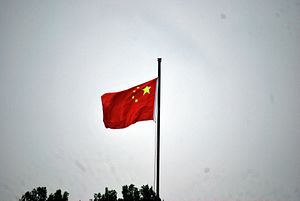The Diplomat author Mercy Kuo regularly engages subject-matter experts, policy practitioners, and strategic thinkers worldwide for their diverse insights into U.S. Asia policy. This conversation with Dr. Aynne Kokas – associate professor of media studies at the University of Virginia; senior faculty fellow at the Miller Center for Public Affairs; and author of “Hollywood Made in China” (2016) – discusses the recent setback for China’s CGTN in the U.K. and Beijing’s campaign for media influence abroad.
Explain how China Global Television Network (CGTN) seeks to expand its influence in Europe.
China Global Television Network (formerly CCTV International) has been expanding globally since 2000. CCTV International’s efforts in Asia and Africa began in 2007. CGTN America launched in 2012, and CGTN Europe launched in 2019. Its expansion into the European and North American markets was slower due to saturation in those media markets.
What is the impact of U.K. media regulator Ofcom’s decision to terminate CGTN’s U.K. license?
Ofcom’s decision to terminate CGTN’s U.K. license follows concern in many democracies worldwide about CGTN’s news coverage and its relationship to the Chinese state. Thus, the cancelation of the BBC’s permit to broadcast in China immediately afterward also likely served as a form of poetic justice in Chinese regulators’ eyes, the logic being that news that is paid for by the British government should is just as biased Chinese-government funded news. The critical difference, of course, is the editorial autonomy from the British government that the BBC maintains in contrast with the heavy hand of Chinese regulators.
The French broadcasting regulator approved CGTN’s license application to operate in France, which will allow CGTN to broadcast across Europe and the U.K. Analyze the political and propaganda factors behind CGTN’s move.
CGTN’s approach has long been global in nature. Thus, efforts to expand into continental Europe (which would allow for U.K. broadcasting) very much fit within this larger strategy. I think the move to request license approval in France demonstrates the increasing sophistication of CGTN’s approach. In African and Asian markets, CGTN offered broadcasting coverage in areas that had demand for increased local and national media coverage. CGTN’s bid for the U.S. market reflected the comparative ease of entering the highly deregulated U.S. market.
What is at stake for European broadcasting regulators and audiences?
CGTN’s efforts to broadcast in Europe present a particularly challenging situation for European broadcasting regulators. Allowing the broadcasts gives Beijing a clear megaphone in the European market that is difficult to monitor. Because CGTN often employs local talent, expelling it would potentially impact local production jobs if the network is up and running. Regulators would potentially have to deal with employment protections for those local employees if they decided to go back on their decision.
Not allowing CGTN also presents some serious challenges. Rejecting CGTN’s license application presents the risk of cancelation of European journalists’ and media outlets’ visas as in the BBC ban. There is also the possibility that China would respond to such a denial asymmetrically. For example, rather than denying journalist visas, China could refuse to purchase European goods or target specific European companies operating in China. The uncertainty of the Chinese government’s response is likely giving European broadcasting regulators a lot to consider. For Europe’s COVID-ravaged economy, unpredictable Chinese economic retaliation presents a scary prospect.
Explain the geopolitical context of how CGTN serves China’s efforts to influence global media standards and assess implications for U.S.-China soft power competition.
CGTN seeks to share China’s view of the world globally. It does so strategically by sharing news about China and deploying the vantage point of Chinese state-sponsored editors to look at news in countries around the world that commercial news organizations in the West chronically neglect. While attracting substantial viewership around the world, the U.S. TV industry fails to address local issues of concern in the developing world. There, CGTN has become a dominant player for coverage of local news. In this sense, CGTN offers a unique model for building Chinese soft power. Unlike CNN with their preponderance of U.S. coverage, CGTN invests in local television in resource-starved markets. Coverage in such markets offers little appeal for commercially driven U.S. media conglomerates. However, they offer choice opportunities for building influence, a desirable aim for state-sponsored CGTN.

































